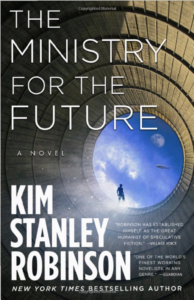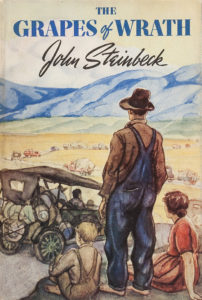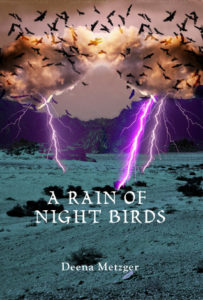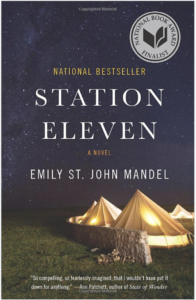
- This event has passed.
A Cli-Fi Book Club for College Educators and Sustainability Advocates
June 3, 2021 @ 2:45 pm - 4:00 pm EDT
This short course in climate fiction (“Cli-Fi”) is the ultimate academic book club for anyone in the higher education sustainability community! Are you a non-literary type who has never attended a book club? Or a bookworm who is obsessed with Cli-Fi? Somewhere in between? Everyone is welcome!
 The interdisciplinary short course in literary fiction will take place over 6 monthly meetings. We will begin with an overview of the emergent genre of Cli-Fi and a curated book list of “teachable” novels organized by theme. Selected novels integrate science, economics, engineering, and psychology into humanities, communication, and storytelling to imagine a new future.
The interdisciplinary short course in literary fiction will take place over 6 monthly meetings. We will begin with an overview of the emergent genre of Cli-Fi and a curated book list of “teachable” novels organized by theme. Selected novels integrate science, economics, engineering, and psychology into humanities, communication, and storytelling to imagine a new future.
Participants will:
- Gain an overview of the genres of climate fiction and post-apocalyptic fiction;
- Learn speed reading techniques and how to create time to read more;
- Practice discussion techniques with other sustainability champions;
- Engage with faculty from a variety of disciplines including science, humanities, and social sciences;
- Integrate imagination and the envisioning of climate change mitigation, adaptation, and resilience.
Key Details
Event Date & Time: Course participants will meet virtually on the first Thursday of the month from 2:45–4:00 p.m. EDT starting on June 3 and continuing through November 4.
Location: The workshop will take place online via Zoom.
Registration Fee: $95 (AASHE members), $125 (AASHE non-members) and $50 for Student participants.
Registration Policies:
- Registration deadline is Thursday, June 3, 12:00 p.m. EDT.
- Payment is accepted in the form of Visa, MasterCard, American Express, Discover cards, ACH transfers or checks.
- Cancellation Policy: A 20% processing fee applies to any cancellation prior to May 24, 2021. No refunds will be given after May 24, 2021.
- No substitutions are allowed.
- Review all Terms & Conditions.
Instructor
Krista Hiser, Professor, Kapi’olani Community College
 Krista Hiser, Ph.D. will be your guide for the course. Krista is a longtime English professor who has been teaching and obsessively reading post-apocalyptic and Cli-Fi novels for many years. She published an essay in 2010 called Pedagogy of the Apocalypse, and she was recently featured on Episode 51 of Citizens Climate Radio “Art and Identity in a Time of Climate Change”. She is interested in how fiction can help students visualize sustainability solutions and the issues and impacts of our climate predicament.
Krista Hiser, Ph.D. will be your guide for the course. Krista is a longtime English professor who has been teaching and obsessively reading post-apocalyptic and Cli-Fi novels for many years. She published an essay in 2010 called Pedagogy of the Apocalypse, and she was recently featured on Episode 51 of Citizens Climate Radio “Art and Identity in a Time of Climate Change”. She is interested in how fiction can help students visualize sustainability solutions and the issues and impacts of our climate predicament.
2021 Book Club Themes and Novels
 |
 |
 |
 |
June 3: Cli Fi, Sci Fi, and the Culture of Sustainability
An overview of the emerging genre of Climate Fiction and its function in Literature and Environmental Humanities. What makes a teachable novel? How can literature be used across disciplines and in extracurricular settings? Bonus: speedreading techniques and facilitating interdisciplinary dialogue.
July 1: Geoengineering: Should we or Shouldn’t We?
Ministry for the Future by Kim Stanley Robinson
Engineering, Economics, Ethics, Environment
Kim Stanley Robinson’s epic world-building tale includes detailed descriptions of successful geoengineering projects. We’ll discuss these fictional projects from the perspective of economics, engineering, environmental impact, and ethics. Is it feasible? Or dangerous? Other books that describe geoengineering will also be discussed, including Blaze Island by Catherine Bush.
August 5: Considering Forced Climate Migration in the U.S.
Grapes of Wrath by John Steinbeck (1939)
History, Economics, Soil Science, Sociology
Soil research indicates the Dust Bowl was in fact a climate-related disaster. Revisiting Steinbeck’s classic novel about the experience of the Okies as climate migrants helps unpack ways that the U.S. will be changed by forced climate migration in the coming decades.
September 2: Traditional Ecological Knowledge in the Academy
Rain of Night Birds by Deena Metzger, 2017
Indigenous Perspectives, Higher Education, Ecology
“Perhaps never before in the history of humankind has the disparity between Indigenous mind and Western mind been more on the pulse of what we must pay attention to in order to ensure our survival.” Deena Metzger’s novel, a love story set in a University context, provides an opportunity for reflection on epistesteomologies and practices in higher education. With Guest Lecture on “The Literature of Restoration” by the Deena Metzger
October 7: Pandemic
Station 11 by Emily St. John Mandel
After a flu pandemic decimates the world population, survivors regroup and rebuild, inspired by art, drama, and music. An HBO Max series based on the novel is in the works. Other pandemic-themed novels will be discussed, including World War Z and Oryx and Crake.
November 4: What Next?
How to integrate climate fiction on your campus, what to read next, cultivating imagination, future-vision, and storytelling capacities.
Any questions about the workshop?
Please contact Daita Serghi.